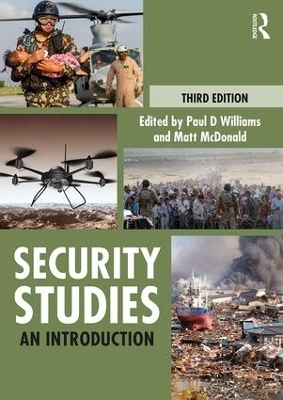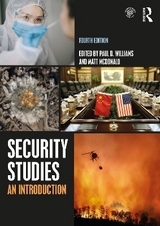
Security Studies
Routledge (Verlag)
978-0-415-78490-0 (ISBN)
- Titel erscheint in neuer Auflage
- Artikel merken
Security Studies: An Introduction, 3rd edition, is the most comprehensive textbook available on the subject, providing students with an essential grounding in the debates, frameworks, and issues on the contemporary security agenda.
This new edition has been comprehensively revised and updated, with new chapters added on poststructuralism, postcolonialism, securitization, peace and violence, development, women, peace and security, cybersecurity, and outer space.
Divided into four parts, the text provides students with a detailed, accessible overview of the major theoretical approaches, key themes, and most significant issues within security studies.
Part 1 explores the main theoretical approaches from both traditional and critical standpoints
Part 2 explains the central concepts underpinning contemporary debates
Part 3 presents an overview of the institutional security architecture
Part 4 examines some of the key contemporary challenges to global security
Collecting these related strands into a single textbook creates a valuable teaching tool and a comprehensive, accessible learning resource for undergraduates and MA students.
Paul D. Williams is Associate Professor and Associate Director of the Security Policy Studies MA Program in the Elliott School of International Affairs at the George Washington University. Dr Williams is also a non-resident senior adviser at the International Peace Institute in New York. His most recent publications include Fighting for Peace in Somalia: A history and analysis of the African Union Mission (AMISOM), 2007–2017 (Oxford University Press, 2018); War and Conflict in Africa (Polity, 2nd edition, 2016); The Oxford Handbook of United Nations Peacekeeping Operations, edited with J. Koops, N. MacQueen, and T. Tardy (Oxford University Press, 2015); Providing Peacekeepers: The Politics, Challenges, and Future of United Nations Peacekeeping Contributions, edited with A.J. Bellamy (Oxford University Press, 2013); and Understanding Peacekeeping, with A.J. Bellamy (Polity, 2nd edition, 2010). Matt McDonald is Reader in International Relations at the School of Political Science and International Studies at the University of Queensland. His most recent publications include Ethics and Global Security: A Cosmopolitan Approach, with Anthony Burke and Katrina Lee-Koo (Routledge, 2014) and Security, the Environment and Emancipation (Routledge, 2012). He is co-editor of the Australian Journal of Politics and History.
An Introduction to Security Studies Part 1: Theoretical Approaches 1. Realisms 2. Liberalisms 3. Constructivisms 4. Critical Theory 5. Feminisms 6. Post-Structuralisms 7. Securitization 8. PostColonialism Part 2: Key Concepts 9. Uncertainty 10. Polarity 11. Culture 12. War 13. Coercion 14. Peace and Violence 15. Human Security 16. The Responsibility to Protect 17. Development Part 3: Institutions 18. Alliances 19. Regional Organizations 20. The United Nations 21. Peace Operations 22. The Nuclear Disarmament and Non-Proliferation Regime 23. Private Security Companies Part 4: Contemporary Challenges 24. Genocide and Crimes Against Humanity 25. Ethnic Conflict 26.Terrorism 27. Counterterrorism 28. Counterinsurgency 29. Intelligence 30. Transnational Organized Crime 31. International Arms Trade 32. Migration and Refugees 33. Energy Security 34. Women, Peace and Security 35. Environmental Change 36. Health 37. Cybersecurity 38. Outer Space
| Erscheinungsdatum | 14.06.2018 |
|---|---|
| Zusatzinfo | 7 Tables, color; 6 Line drawings, color; 1 Halftones, color; 7 Illustrations, color |
| Verlagsort | London |
| Sprache | englisch |
| Maße | 174 x 246 mm |
| Gewicht | 1338 g |
| Themenwelt | Sozialwissenschaften ► Politik / Verwaltung ► Europäische / Internationale Politik |
| ISBN-10 | 0-415-78490-5 / 0415784905 |
| ISBN-13 | 978-0-415-78490-0 / 9780415784900 |
| Zustand | Neuware |
| Haben Sie eine Frage zum Produkt? |
aus dem Bereich



